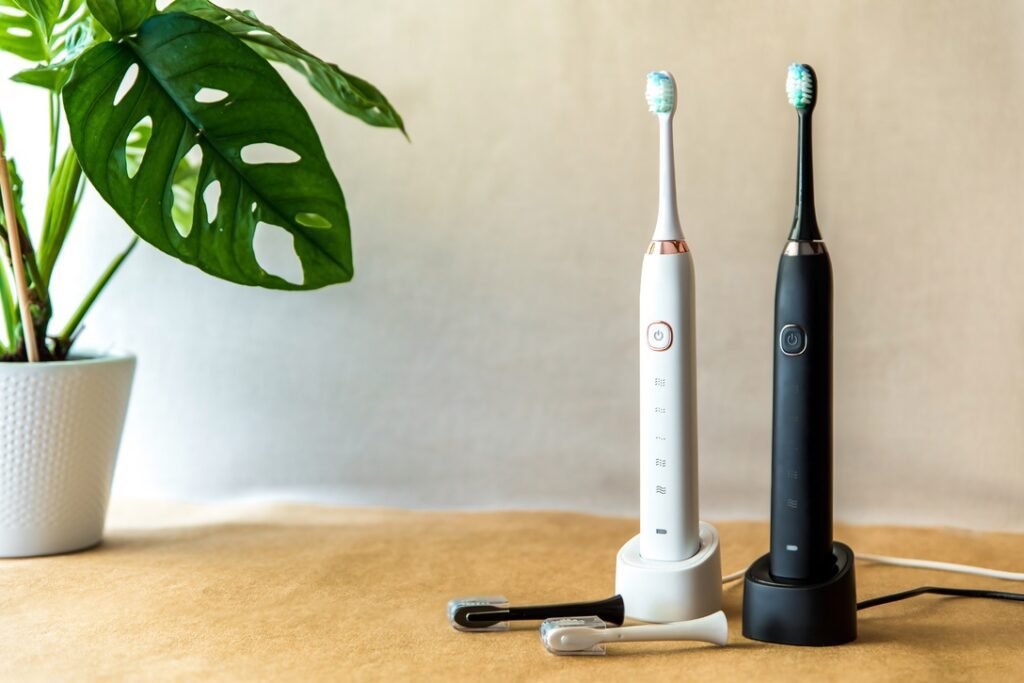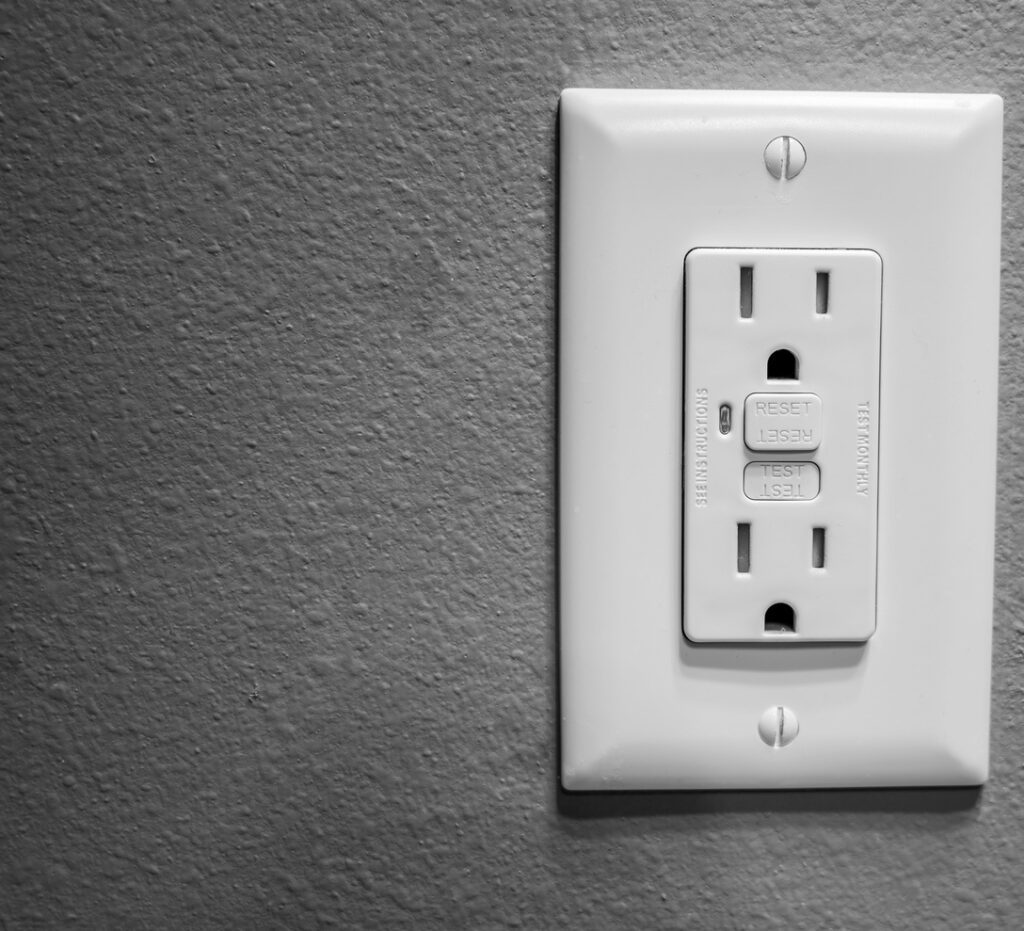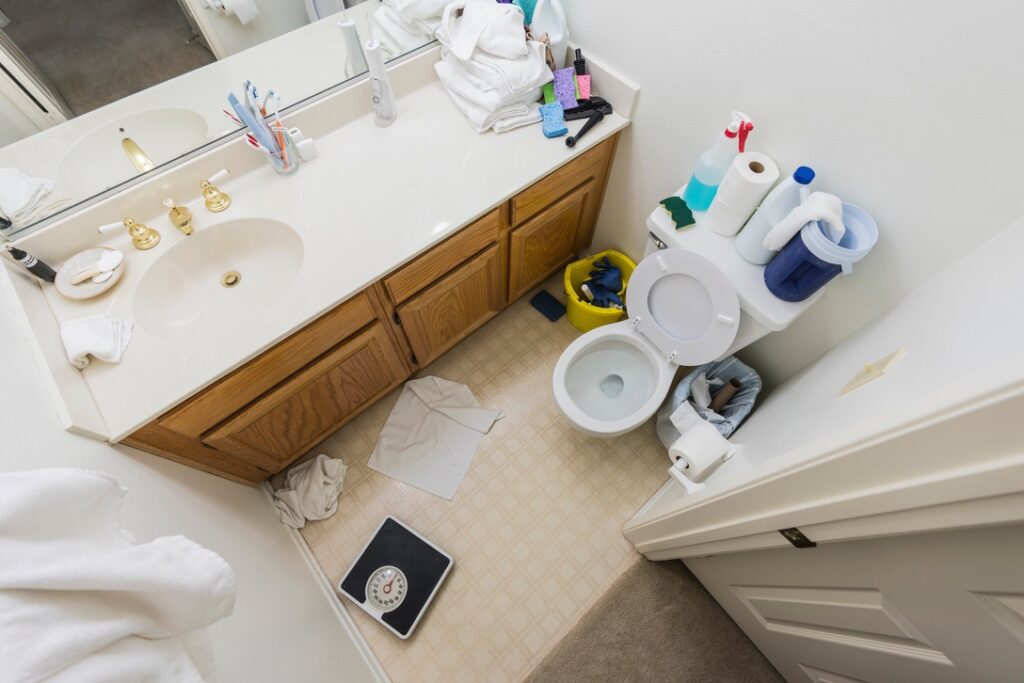Summary:
- Ensure electrical devices like hair dryers and electric razors are kept away from water sources, are unplugged when not in use, and their cords don’t pose a tripping hazard.
- Install and regularly test Ground Fault Circuit Interrupter (GFCI) outlets in the bathroom to prevent potential shocks.
- Be mindful of the total wattage when plugging devices into power strips or circuits to avoid overloading and potential fire hazards.
- Regularly inspect bathroom devices such as hair dryers, electric razors, and electric toothbrushes for wear and damage, and replace or repair as needed.
- Keep the bathroom clutter-free by storing electrical devices safely, keeping cords away from water, and unplugging devices when they’re not in use.
Your bathroom is more than just a space for daily hygiene routines; it’s also where you prepare for the day ahead and unwind afterwards. But with all the lights, appliances, and other electrical technologies in this part of your home—often in close proximity to water—electrical safety should be top of mind during these activities.
With years of experience performing thorough electrical inspections for Calgary homes, 4-Star Electric is here to help. Below, we share seven critical safety tips to help keep your bathroom as safe as it is relaxing.

Via Adobe Stock.
1. Thoughtfully Position & Use Electrical Devices
From hair dryers to electric razors, various electrical devices are often essential to our bathroom routines. However, it’s crucial to keep these devices safely distanced from water sources, as water and electricity can create a risk of electrical shocks.
When using these devices, remember to:
- Follow the manufacturer’s instructions for usage to avoid potential electrical hazards.
- Keep devices unplugged when not in use and store them safely away from sinks, bathtubs, and showers.
- Ensure cords are not draped across areas where people walk to minimize the risk of tripping hazards.

Via Adobe Stock.
2. Install GFCI Outlets
Ground Fault Circuit Interrupter (GFCI) outlets are as necessary in bathrooms as they are in kitchens, and they are mandatory in all new Calgary homes. These outlets cut off electric power when they detect a ground fault or leakage current, shielding you from potential shocks.
If your bathroom lacks these outlets, contact our professional electricians to install them at your earliest opportunity. You should also test each of your GFCI outlets monthly by pressing the “Test” button. If the power on the outlet doesn’t cut off, it’s time to replace it.
3. Use Power Strips Wisely & Be Aware of Circuit Load
Power strips can offer a convenient solution when you need to use or charge multiple devices at once—like your hair dryer, electric razor, and electric toothbrush. However, it’s crucial to be mindful not to overload the circuit, as this could cause a short or even start a fire depending on the age and condition of your home’s electrical infrastructure.
When using these devices, consider their average electrical consumption:
- Hair dryer: Typically between 1250-1875 watts
- Electric razor: Roughly 15-20 watts
- Electric toothbrush: About 1-2 watts
The number of watts you can safely plug into a power strip depends on the rating of the power strip and the circuit it’s plugged into.
In North America, residential circuits are usually rated for 15 or 20 amps at 120 volts. Therefore, a 15-amp circuit can handle up to 1,440 watts (15 amps x 120 volts) total, and a 20-amp circuit can handle up to 2,400 watts (20 amps x 120 volts).
However, to avoid overloading, it’s required to not exceed 80% of the circuit’s capacity for a circuit. This means a maximum of 1,440 watts for a 15-amp circuit and 1,920 watts for a 20-amp circuit.
Power strips also have their own rating, often indicated on the packaging or the strip itself. Some strips may be rated for as little as 1,000 watts, while others can handle up to 1,800 watts or more. Always check the power strip’s rating and make sure not to exceed it.
Ultimately, it’s much safer to distribute the usage of high-wattage bathroom devices rather than using them simultaneously on the same power strip. We also recommend that you unplug any devices that aren’t being used to further ensure safety.
4. Regularly Inspect & Maintain All Devices
The electrical devices listed above (and many others that are commonly found in bathrooms) may require your attention over time. Here’s a quick list of potential safety issues to look out for:
- Hair dryers: Inspect cords for fraying, especially near the plug. Regularly remove any built-up lint or hair from the air intake.
- Electric razors: Check for damage to the cord or the plug. Also, ensure the razor is clean and functioning properly, as debris caught in the device can force the motor to work too hard and put stress on the device’s components.
- Electric toothbrushes: Examine the charging station for any signs of wear or damage, and check the toothbrush itself for any signs of water ingress or battery leakage.
Regularly inspecting these devices and replacing or repairing them as needed can help you avoid any potential hazards before they cause issues.

Via Adobe Stock.
5. Maintain a Clutter-Free Bathroom
An organized bathroom is a safer bathroom. Here are a few tips to help you keep your space well-ordered and safe:
- Store electrical devices like hair dryers, curling irons, and electric razors in designated drawers or cabinets when not in use.
- Keep cords neatly wound and away from sinks or bathtubs to avoid water contact.
- Avoid leaving devices plugged in when they’re not in use to minimize fire hazards.
- Keep your bathroom surfaces clean and organized to help you quickly spot and address potential safety issues like pooling water or exposed wiring.
6. Educate Family Members on Bathroom Electrical Safety
Knowledge is power, especially when it comes to electrical safety. Here are some tips you can share with your family to help keep everyone safe when using electrical devices in the bathroom.
- Never handle plugged-in devices with wet hands.
- Avoid plugging in or using electrical appliances near filled sinks or bathtubs.
- Unplug devices once you’ve finished using them.
- Always ensure that the bathroom ventilation fan is in good working order to prevent steam from causing dampness, which could lead to an electrical hazard over time.
- Regularly check the operation of GFCI outlets and know how to reset them.
By sharing and following these tips, you can help maintain a safe bathroom environment for everyone in your family.
7. Know When to Call a Professional Electrician
Many electrical issues aren’t safe to address yourself and demand professional expertise. If you encounter persistent problems like frequent circuit breaker trips or sparking outlets, call us for help instead of putting yourself and your family at risk.
At 4-Star Electric, your safety is our priority. We’re here to help with electrical work in your bathroom or any other part of your home. From installing GFCI outlets to repairing complex electrical problems, you can rely on us for dependable, expert-level service.
Remember, a safe bathroom is a happy bathroom. By adhering to these tips, you can ensure that your bathroom remains a haven of relaxation and tranquility.


